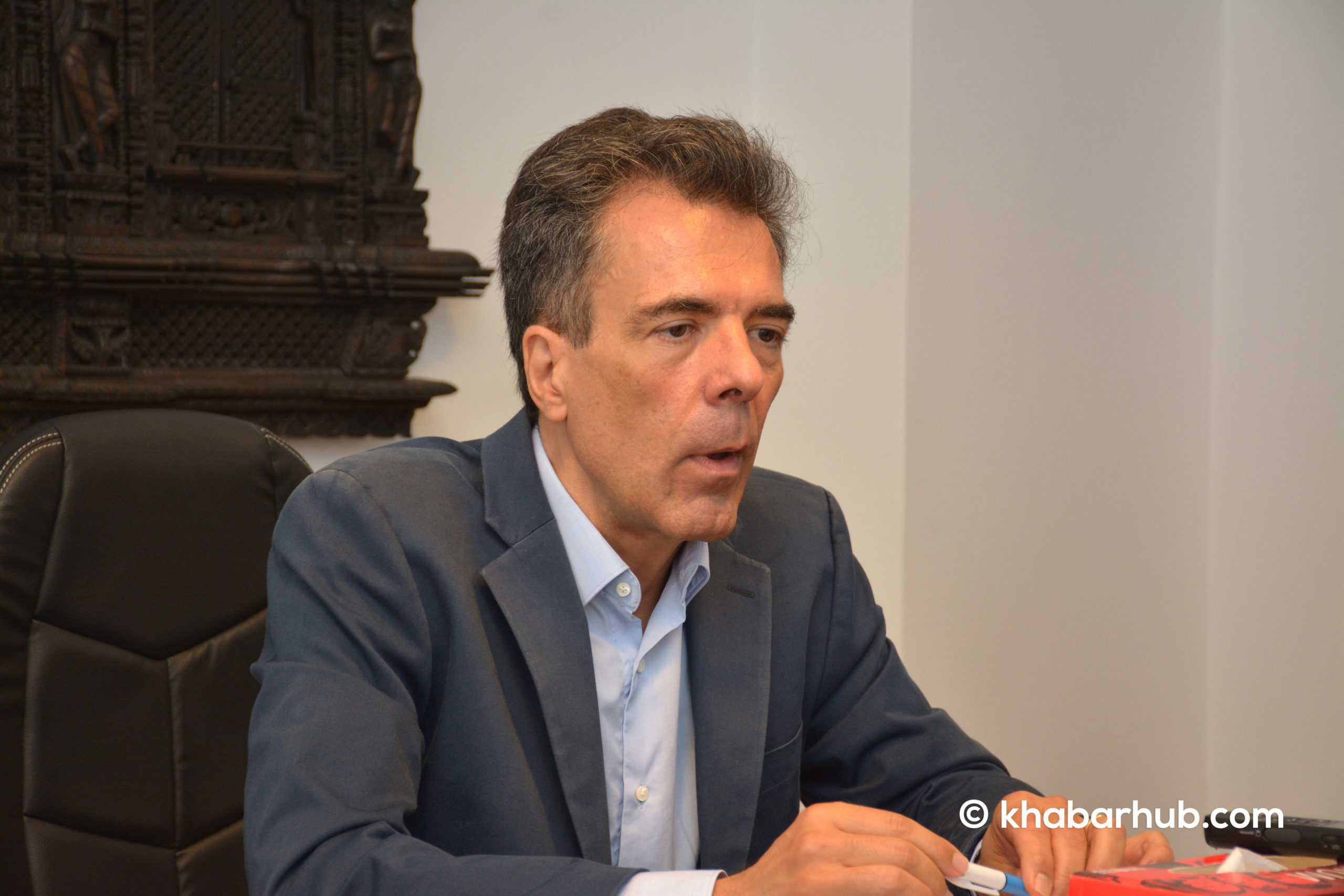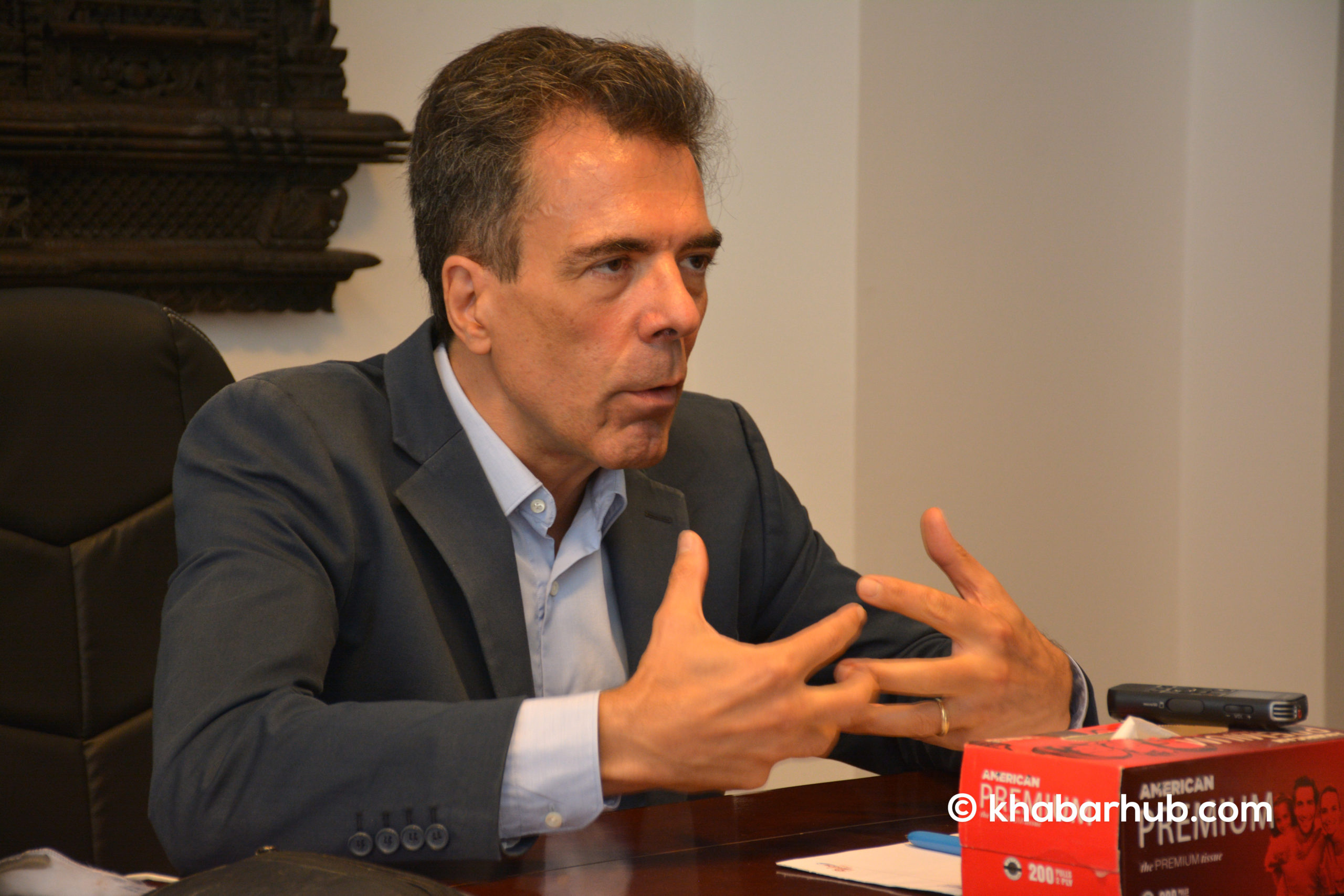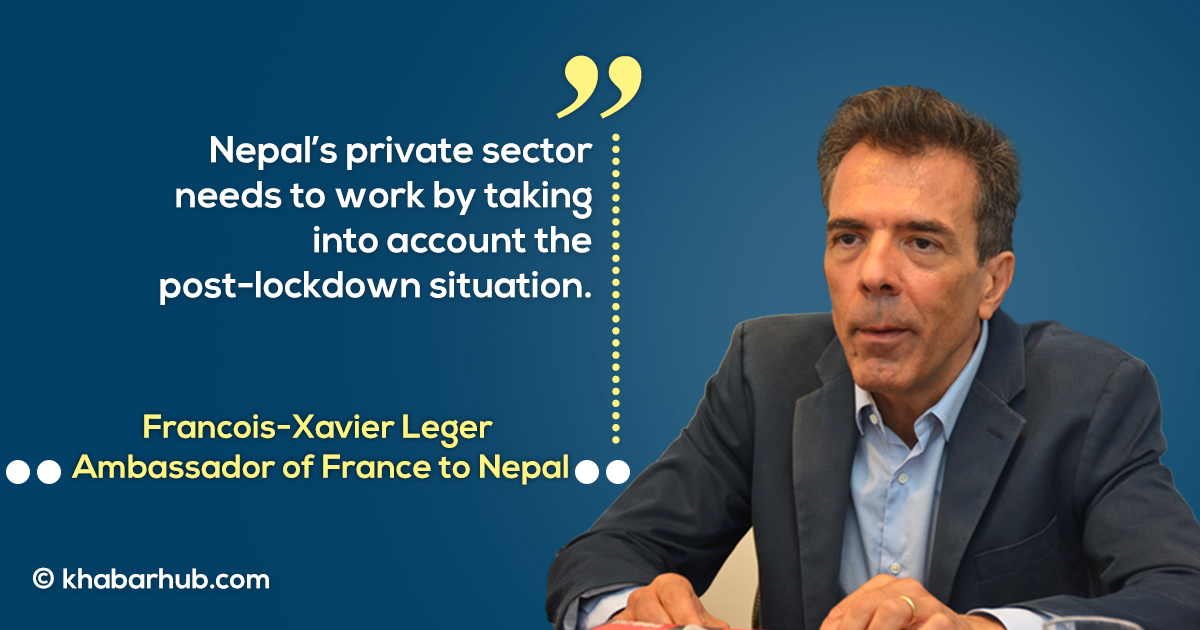KATHMANDU: Despite being far away in terms of geography, Nepal and France have always stood together on several fronts, including people-to-people relations, peace-keeping operations, among others.
Nepal and France celebrated their 70th anniversary of the establishment of bilateral relations recently. It should not be forgotten that France is the fourth country after the UK, USA and India to establish diplomatic ties with Nepal. Ishwar Dev Khanal of Khabarhub caught up Francois-Xavier Leger, Ambassador of France to Nepal to discuss the current situations and Nepal-France relations. Excerpts:
It’s been almost two years since you have been in Nepal. What achievements, particularly in Nepal-France relations, have been made during this period?
Since I arrived in Nepal nearly two years ago, we remained quite busy with several engagements here, especially on commemorating the 70th anniversary of the bilateral relations between France and Nepal.
We, in fact, organized a lot of events in Nepal to enhance political dialogue, and further strengthen our relations. The last one year has been quite significant in bolstering the ties between the two countries, particularly at political travel, tourism, economic and trade, among others.
And as far as political dialogue is concerned, we had a great opportunity to welcome Nepal’s Prime Minister KP Oli in Paris in June last year, which was quite meaningful. He also met with French private companies and investors and discussed trade and investment between the two countries.
Moreover, this year 2020 is a commemoration of the advent of Mt Annapurna I by a French expedition team led by Maurice Herzog in June of 1950. This was, in fact, the first in history that somebody could go above 8,000 meters. This, I believe, was a kicking point of French tourism in Nepal.

Meanwhile, we also engaged ourselves in a business forum in Nepal with the FNCCI last June. There was also a delegation of French private sector to Nepal to interact with the Nepali business community and to assess the possibilities of joint ventures here.
In the last one year, we remained extremely busy with meaningful meetings and programs. We also had a goodwill ambassador, Shrinkhala Khatiwada who supported us to reach out to various public places and meet young yet promising people in Nepal.
We also discussed bringing more French tourists to Nepal in the coming years. Every year, we have an average of 30,000 French tourists visiting Nepal, mainly for trekking and outdoor activities.
However, in the coming season, the number is likely to go down. Despite uncertainty, I am confident that people, who are friends of Nepal, will definitely visit this beautiful country.
What is more significant is that Nepal has all the ingredients, including its rich culture and heritage, among others to welcome more tourists, especially the French tourists who love to visit Nepal. As soon as the situation gets normal, Nepal will continue to see an influx of tourists.
How do you see the prospect of Nepal’s tourism post-COVID-19 pandemic? How optimistic are you about bringing in more French tourists to Nepal?
You see, I cannot say anything outright as it purely depends on what Nepal can offer to the tourists, and how it can re-brand Nepal as a tourist destination, and to maximize the country’s economy as over 350 thousand people are directly or indirectly linked with this sector.
In my meetings with Nepal’s Minister for Culture, Tourism and Civil Aviation, we basically talked about promoting Nepal’s tourism. I have always been supportive to promote Nepal’s tourism, and the ministry can learn many things from France, if not all, about diversifying the destinations and upgrading tourism.
France, as I said, will always welcome the Minister for Tourism to our country to get some ideas of tourism promotion. We now need to plan on moving ahead.
We, however, cannot expect a normal situation this year soon. However, many things can be done to promote Nepal as a tourist destination.
Moreover, the government of Nepal has decided to resume international flights from August 17.

Yes, the government has decided to resume international flights from August 17. However, I believe that the government would ensure some necessary precautionary measures, including sanitary provisions.
It is also important whether the visitors are required to undergo PRC tests and other formalities. This, I think, is important for the next season.
What is your observation about the government’s efforts to stem the coronavirus pandemic?
We are closely observing the measures being taken by the government here to stem the spread of coronavirus.
And yes, this is a new virus and the whole world is suffering from. Nepal, too, cannot be spared. The government, I feel, is endeavoring to the best of its ability to ensure that the pandemic does not spread in its capacity.
Yes, the Government of Nepal did a great job by repatriating all its tourists safely and the administration has done their best to ensure that the Nepalis are safe.
How did the lockdown and the pandemic affect your life?
The pandemic has adversely affected the normal lives of the people, including the diplomatic community here as well. Yes, we have not been able to organize social activities, discussions, and other events.
We have limited ourselves to Zoom meetings as the core of the activities and discussions have, I would say, disappeared for now. However, we have been focusing on consular activities.
And, if you ask me, my activities are to commute from my residence to the Embassy and working a lot, particularly on repatriation flights.
Did you have any political or business meetings in this period?
I had absolutely no meetings in the last four months. Earlier in March, I met with Minister for Finance Dr Yuba Raj Khatiwada. I, however, had a phone conversation with Foreign Minister Pradeep Gyawali, who gave me a courtesy call and apprised me of the current situation.
As many as 500 French NGOs are engaged in Nepal in one way or the other. What are they doing now?
Yes, several French NGOs – big and small — working in different areas of Nepal including in the sectors like human rights, inclusion, and action against hunger have now focused on COVID-19 programs by supporting people, mainly from the vulnerable groups and the daily wage workers.

In fact, people from France who visit Nepal for tourism, have been developing human relations with local people in the villages. Driven by spirit and compassion, the French NGOs came into existence for helping locals of Nepal.
The government lifted the lockdown recently considering the adverse impact on the economy. What is your observation?
The issue of lifting the lockdown was discussed in France as well. The issue is itself complicated as it cannot be termed too early or too late. Nepal, too, faced a difficult situation.
People, particularly, the daily wage workers were facing hardship. Now with relaxation, people need to pay special attention to sanitary issues, maintaining physical distance, and other precautionary measures.
What needs to be done to revive the country’s economy that has been hit hard by coronavirus pandemic?
I believe that the country’s private sector needs to understand and work accordingly by taking into account the current situation.
Nepal and France have enjoyed a multidimensional relationship in several areas of human activities. How do you look at the whole thing?
Frankly speaking, the relation between Nepal and France is historic. They have enjoyed a long partnership. Moreover, Nepal is a very important contributor to the peacekeeping mission.
Nepal is politically stable now and I think this is the right time for French companies to come here for market research and making investments by collaborating with some Nepali partners. In fact, Nepal has a positive image in France, therefore, we need to build on this image.
Anything you would like to share with Nepali people?
When I arrived here nearly two years ago, I was really surprised to see how Nepali people were so resilient and worked so hard despite all odds.
People here have a lot of energy and good vibes here. With the COVID-19 pandemic, I was puzzled by the city and everybody was wondering how they would be facing the situation.
And finally, we are at the end of the lockdown, people have started tackling the disease in their own way. And coming back to work, and this is a great lesson for everybody.









Comment